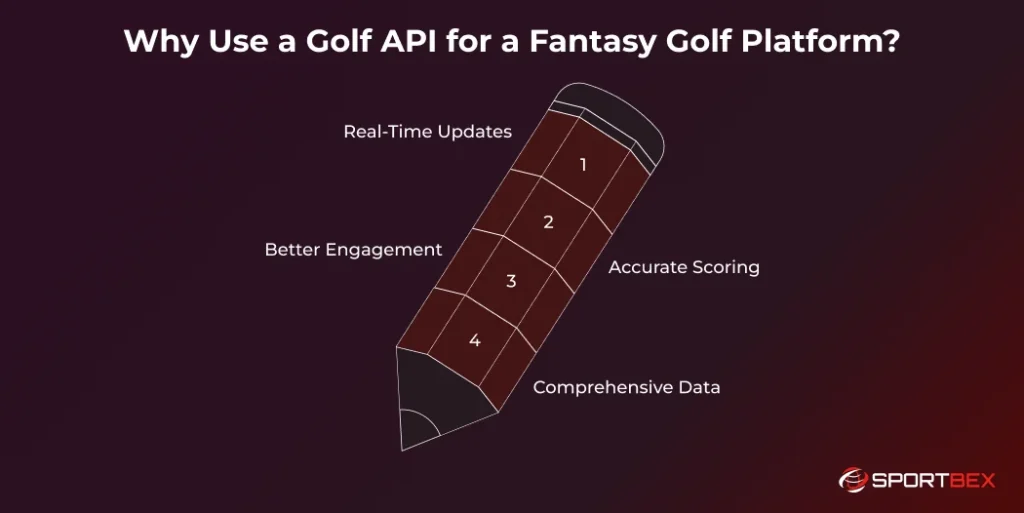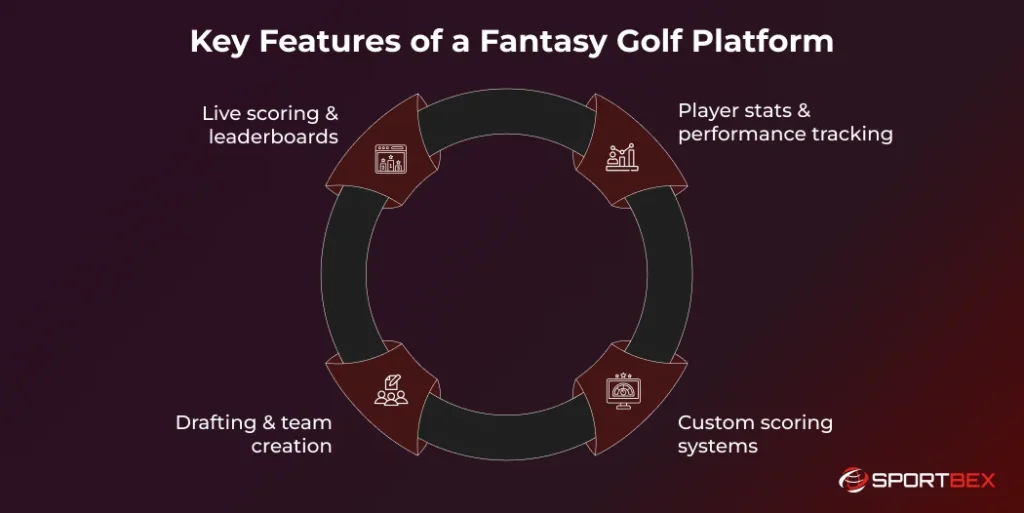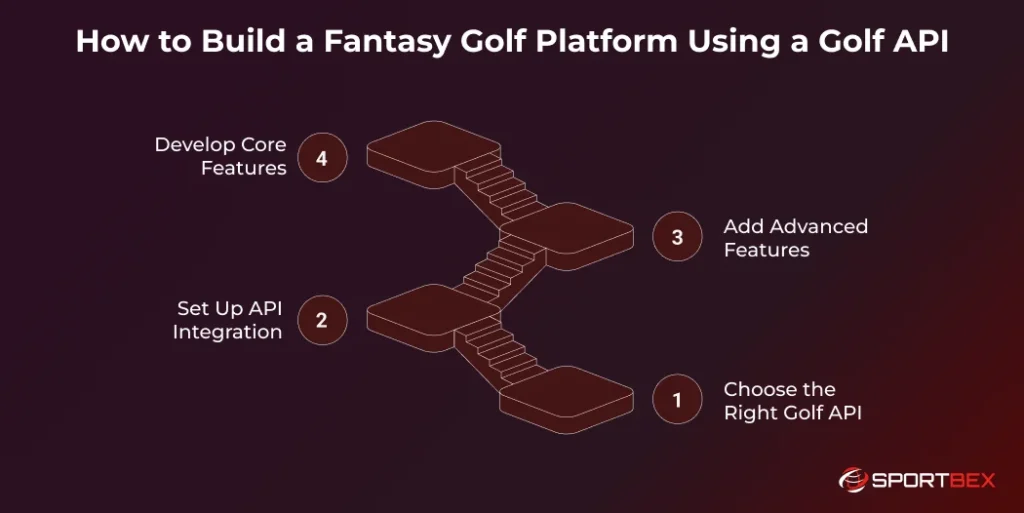Fantasy sports have changed how fans connect with their favorite games. Instead of just watching, they plan, play, and celebrate like their favorite athletes. While football and basketball are the most popular, fantasy golf is becoming a fun, new option for developers.
To create a great fantasy golf platform, you need more than just love for the game. You need real-time data like live scores, player stats, tournament updates, and course conditions. That’s where a Golf Data API comes in. It gives you all the info you need to build a fantasy golf app that keeps users coming back.
This guide will show you how to build a fantasy golf platform using a Golf API. We’ll cover the main features, how to set it up, and tips to make it fun and exciting, just like professional golf!
What is a Fantasy Golf Platform?
A fantasy golf platform is an online game where you pick a team of real professional golfers and score points based on their performance in actual tournaments.
Unlike fantasy football, you typically pick golfers for a single tournament rather than an entire season. Many developers create a fantasy sports app to offer this kind of interactive experience to users.
Fantasy golf platforms offer various formats. Daily Fantasy Sports (DFS) allows users to create new teams for each tournament, while season-long formats let players manage the same team all season. Some platforms offer both options.
Fantasy golf is uniquely unpredictable. Unlike weekly football games, tournaments are influenced by weather, course conditions, and field sizes. This adds excitement, but demands accurate data tracking for fair scoring.
Modern platforms have added social features, expert insights, and educational tools. Players can join leagues, enter contests, and access detailed stats. The best platforms build communities where users can share tips, discuss predictions, and celebrate wins.
Why Use a Golf API for a Fantasy Golf Platform?

Building a fantasy golf platform requires a strong data source. Without a Golf API, it’s like running a tournament without scorecards. An API provides essential live data, accurate scoring, and detailed player information, crucial for a professional application.
Real-Time Updates
Golf tournaments are dynamic, with changing leaderboards, weather, and player performance. A professional Golf API delivers real-time updates, including stroke-by-stroke scores, position changes, and key developments affecting fantasy scoring.
Real-time data is more than just basic scores. For instance, if a player makes a game-changing putt on the 18th hole, your platform can instantly update standings and notify users with affected fantasy teams, keeping them engaged. This is a key part of fantasy golf app development.
Accurate Scoring
Accurate scoring is essential for fantasy sports. If your scores are wrong, users will lose trust in your platform, which can permanently damage your reputation. Professional Golf APIs have strict quality checks and experienced teams to make sure the data is correct.
Golf scoring is more complex than in other sports. Things like penalty strokes, course conditions, and rules can change the final score. A professional API gets data directly from tournament officials, ensuring your platform shows the right results.
Better Engagement
Users want interactive tournament experiences, which a strong Golf API provides through live leaderboards, real-time updates, and dynamic scoring. These features turn passive viewing into active participation, driving repeat visits.
Good data keeps users engaged. With insights on potential winners, player trends, and head-to-head comparisons, users make smarter decisions. Tracking performance, recent scores, and records boosts engagement, especially in fantasy golf app development, keeping users on your platform.
Comprehensive Data
A good sports data API provides historical data, player bios, tournament information, and course details, not just current scores. This wealth of information lets you offer advanced features like player comparison tools and performance analytics, setting your platform apart.
Historical data is vital for fantasy golf, letting users analyze trends, track seasonal performance, and build long-term leagues. They can see player performance on specific courses or in various weather, attracting serious players who make data-driven decisions.
Key Features of a Fantasy Golf Platform

Good fantasy golf platforms have basic functions and cool new features that make the game fun and competitive. These features need to work well together, even with golf’s unique challenges as a fantasy sport.
Live Scoring & Leaderboards
Every fantasy golf app needs a great live scoring system and leaderboards. Unlike other sports where scores are updated occasionally, golf scores change constantly during a tournament. Your platform must instantly update scores when a player finishes a hole, advances a round, or completes the tournament.
Good leaderboards let users see different ways their team is doing. They want to know their overall rank, how they compare to friends, and how they’re doing in specific contests. The best platforms even show how their rank has changed throughout the tournament.
Cover Every Major Golf Tournament
Get live leaderboards and player stats from the PGA, LPGA, and European Tour.
Player Stats & Performance Tracking
Detailed player stats make fantasy games more fun and help users get more involved in the tournament. Besides just scores, users want to see specific performance details. This helps them judge how well a player is doing, if they’re good on a certain course, and what their recent performance looks like.
Users should also be able to track performance over time. This means looking at how a player does across many tournaments, over different seasons, and throughout their career. Seeing this history helps users make smarter decisions and learn more from your platform.
Custom Scoring Systems
Scoring systems should be flexible to match different players’ preferences and various contest types. Users can choose between traditional stroke-based scoring or point systems that reward achievements like birdies or eagles.
Standard scoring options should include:
- Stroke play
- Modified stroke play with penalties for missed cuts
- Point-based systems that award points for specific achievements
It’s important to clearly communicate the scoring rules before users set their lineups. This helps avoid confusion, prevents disputes, and allows users to make strategic choices based on the format.
Drafting & Team Creation
The team creation process is a user’s first major interaction with your platform, so it’s crucial for their overall experience. A user-friendly drafting interface helps them build teams quickly while giving them the information they need to make smart picks.
Good drafting systems should support different game types and salary cap rules. For example:
- Daily Fantasy: Players usually have a salary, and users must build a team that stays within a set budget.
- Season-Long: These can use “snake” drafts, where the draft order reverses each round, or auction-style drafts, where players bid to choose their picks.
How to Build a Fantasy Golf Platform Using a Golf API

1. Choose the Right Golf API
Choosing the right Golf API is the most important step in building your platform. The quality of your data directly affects how users enjoy your platform and if it succeeds. Here’s what to look for:
- What data does it cover? Ensure the API covers key tournaments and tours your audience values, such as the PGA Tour, major championships, and international events.
- How often does it update? Real-time data keeps users engaged during tournaments. Verify the API’s update speed and reliability, particularly for major events.
- Is the data accurate? Ensure their data is reliable—ask for references and how it’s gathered and verified. It’s better to pay more for accuracy than fix mistakes later.
- Is it easy for developers to use? Good API instructions and quick support will save you time and money. Look for stable APIs that clearly communicate changes.
- How much does it cost? Providers charge differently. Understand their pricing and how it fits your budget and future plans.
2. Set Up API Integration
After choosing a Golf API, the next step is to integrate it into your platform. Secure your integration by using HTTPS and properly managing API keys to protect your data and users.
Organize the PGA API data so it matches your platform’s structure. This ensures that scores, stats, and tournament information display correctly and consistently for your users.
Use error handling to manage temporary issues without disrupting the user experience. Caching can also improve speed and reduce API calls. Test the integration thoroughly to ensure it works smoothly in various scenarios.
3. Develop Core Features
Once integrated, focus on the main features for your fantasy golf app development. Include secure and easy-to-use user registration and login systems to support a smooth fantasy football golf experience for your users.
Develop team creation tools and real-time scoring so users can manage their teams and track points instantly. Leaderboards should be clear, mobile-friendly, and show rankings across contests and friends’ groups.
Make sure your scoring system is accurate and transparent so users trust their results. If you plan to monetize, integrate secure payment options for subscriptions or entry fees to provide a smooth user experience.
4. Add Advanced Features
To make your platform stand out, add advanced features that keep users engaged. This can include player comparison tools, performance trends, private leagues, and push notifications for key events like birdies or eagles.
Mobile apps or progressive web apps make it easy for users to follow tournaments on the go. Adding interactive elements like analytics or custom stats enhances user engagement.
Include expert tips, analysis, or original content to add value and justify premium subscriptions. These features help retain users and make your fantasy golf platform more competitive.
Conclusion
Creating a successful fantasy golf platform is a fun way to bring your love for golf and technology together. To make it work, you need a reliable Golf Data API. This provides accurate scores, player stats, and golf tournament updates, which are key to a great user experience.
While basic features like user registration, team creation, scoring, and live leaderboards are essential, advanced options like player comparisons, private leagues, and push notifications can make your app more competitive.
To succeed in fantasy golf, it’s not just about technology. You also need to understand your users and the golf community. Make sure your platform is clear and easy to use, listen to feedback, and keep making it better.
Ready to launch your platform? Use a strong Golf API, integrate it carefully, and build a fantasy golf app with engaging features. Deliver a fun, competitive, and user-friendly experience that golf fans will love. Learn how to use a Golf API for fantasy platforms today and bring your idea to life!
Get Live Odds for Every Tournament
Integrate real-time golf betting odds and player matchups into your platform.
Frequently Asked Questions
A fantasy golf platform is an online game where users select a team of real professional golfers and earn points based on their actual performance in tournaments. It allows fans to compete, strategize, and enjoy golf in a more interactive way.
A Golf Data API provides real-time scores, player stats, tournament updates, and course information. It is essential for building a fantasy golf platform or app, as it ensures accurate scoring, live updates, and a smooth user experience.
A fantasy sports app for golf lets users create teams, track player performance, view live leaderboards, and compete in daily or season-long contests. It transforms golf watching into an interactive, engaging experience.
Key features include live scoring, interactive leaderboards, player stats tracking, team creation and drafting, custom scoring systems, private leagues, performance analytics, and push notifications for real-time updates.
To use a Golf API for fantasy platforms, integrate it into your app or website to fetch live scores, player stats, and tournament data. Ensure real-time updates, error handling, and caching to maintain speed and accuracy for users.
Recent Blog
Real-Time Horse Racing Results API for Betting & Sports Apps
February 3, 2026
 9 min
9 min
Why You Must Compare Live Tennis Odds Before Betting
February 3, 2026
 7 min
7 min







